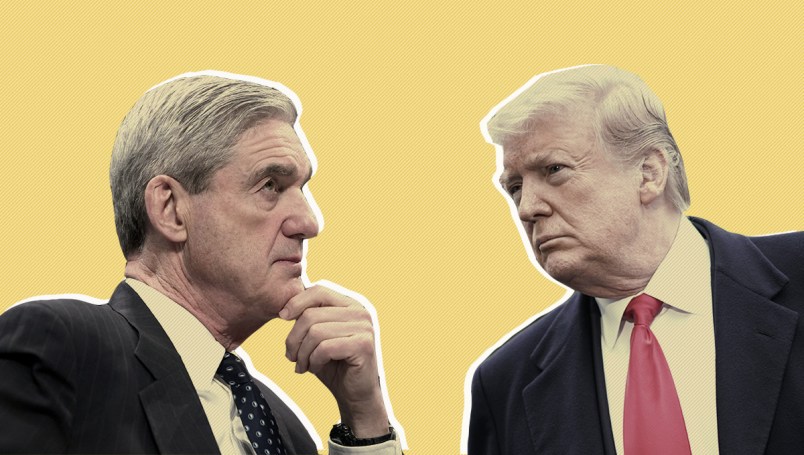In a letter to Congress Sunday summarizing special counsel Robert Mueller’s Russia probe, Attorney General Bill Barr said that the investigation did not find that the Trump campaign coordinated with Russia in its election meddling efforts.

Barr’s letter provided the definition of coordination under which Mueller was operating: an “agreement — tacit or express — between the Trump Campaign and the Russian government on election interference.”

Barr’s letter also covered Mueller’s investigation into whether President Trump obstructed justice. Barr said that Mueller’s report left it up to the attorney general and to Deputy Attorney General Rod Rosenstein to decide the legal question of whether Trump’s conduct amounted to a crime. Barr said that he and Rosenstein determined that the evidence was not “sufficient” to charge the President with a crime.
Their decision not to bring an obstruction charge did not take into account the constitutional question of whether a sitting president could be indicted, according to the letter.
Apparently quoting from Mueller’s report itself, Barr said that Mueller explained that “while this report does not conclude that the President committed a crime, it also does not exonerate him.”
The letter said that all of the indictments Mueller did bring — which included charges against Russians allegedly involved in a social media campaign as well as hacking Democrats’ emails — were publicly disclosed.
Allegations of collusion with Russia had split into three main narratives after the 2016 election. One dealt with potential coordination between the Trump campaign and Wikileaks. A second focused on potential interactions between Trump campaign staff and Russia, and Russia’s online disinformation efforts. A third looked at conflicts of interest generated by the Trump Organization’s attempts during the campaign to build a Trump Tower in Moscow.
Barr’s letter states that Mueller focused on “whether members of the Trump campaign ‘coordinated’ with Russian election interference activities” — identified as the Wikileaks document dump and disinformation efforts led by the Internet Research Agency.
The attorney general said in the letter that while “multiple offers from Russian-affiliated individuals to assist the Trump campaign” were made, the Trump campaign does not appear to have coordinated with the Kremlin after receiving the offers.
The letter does not appear to address counterintelligence concerns that arose during the course of the investigation, many of which revolved around the attempt to build a Trump Tower Moscow.
Speculation surrounding Trump campaign coordination with Wikileaks had centered on GOP operative Roger Stone, who was indicted in January on charges of obstruction, lying to Congress, and witness tampering.
Although Stone claimed to have an inside track to Wikileaks founder Julian Assange and his plans to release hacked emails before the 2016 election, Barr’s letter suggests that his efforts did not rise to the level of conspiracy.
“The Special Counsel did not find that the Trump campaign, or anyone associated with it, conspired or coordinated with the Russian government in these efforts,” he wrote.
The disinformation efforts came mostly from the Internet Research Agency — a Russian company operating under the aegis of Kremlin fixer Yevgeny Prigozhin. Mueller indicted that firm in February 2018 on charges of conspiracy and wire fraud, along with Prigozhin, twelve other Russians and two other companies.
The indictment alleges a scheme that began with two operatives traveling to the United States in 2014 to gather intelligence for the disinformation operation.
Over the next few years, the Internet Research Agency reached millions of people through fake online personas and profiles in an attempt to dampen support for Hillary Clinton and boost Trump.
This included a fake Tennessee_GOP twitter account, which gained 100,000 followers at one point. Overall, the campaign reached 126 million people, according to one estimate.
On Sept. 13, 2017 — after reports emerged that Mueller’s office was probing the Internet Research Agency — one Russian operative wrote to a relative that she “had a slight crisis here at work: the FBI busted our activity.”







Note to self. Research New Zealand immigration application process…
Note to future candidates. It is okay to sell out your country, just don’t put it in writing.
Dem strategy of “blame ROOOOOOSHIN agents first” has exploded. Whoops. Maybe HRC was not popular. Maybe Trump was right about illegals. Dems will never know because ROOOOOSHINS.
Not easy to get in. I looked into it after being there 25 years ago. At that time you had to have plenty of money. They don’t want anyone on the dole.
And that’s the whole ballgame folks